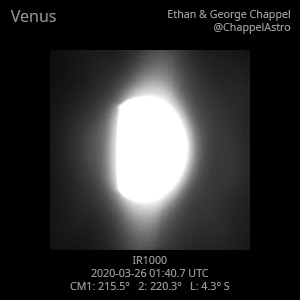
Venus UTC
CM1: 215.50°
CM2: 220.30°
CLat: -4.30°
Much better night for imaging Venus with the C14 than the last session a month ago.
First light of my Thorlabs FELH1000. A filter like this blocks most light reflected off the thick sulfuric acid clouds on the day-side. The clouds also happen to be translucent at 1000nm, allowing the faint infrared light emitted by the surface to be seen on the night-side.
I couldn't have done this without some research and asking around. Here are resources I found useful:
Image the surface of Venus this winter!
ThorLabs 1 micron filter for Venus - Solar System Imaging & Processing - Cloudy Nights
Stuck with researching Venus imaging at 1 micron - Solar System Imaging & Processing - Cloudy Nights
ZWO ASI174MM
Celestron EdgeHD 14
FireCapture v2.6 Settings ------------------------------------ Observer=Ethan Chappel Camera=ZWO ASI174MM Filter=L Profile=Venus Diameter=23.84" Magnitude=-4.37 FocalLength=10550mm (F/37) Resolution=0.11" Filename=2020-03-26-0137_9-EC-L.ser Date=2020_03_26 Start=01_35_29.943 Mid=01_37_59.983 End=01_40_30.024 Start(UT)=01_35_29.943 Mid(UT)=01_37_59.983 End(UT)=01_40_30.024 Duration=300.081s Date_format=yyyy_MM_dd Time_format=HH_mm_ss LT=UT -6h Frames captured=974 File type=SER Binning=no Bit depth=8bit Debayer=no ROI=236x238 ROI(Offset)=0x0 FPS (avg.)=3 Shutter=300.0ms Gain=400 (100%) Gamma=50 (off) Brightness=1 (off) FPS=100 (off) AutoGain=off SoftwareGain=10 (off) USBTraffic=80 (off) AutoExposure=off AutoHisto=75 (off) HighSpeed=off Histogramm(min)=0 Histogramm(max)=255 Histogramm=100% Noise(avg.deviation)=2.97 AutoAlign=false PreFilter=none Limit=300 Seconds Sensor temperature=34.7°C Focuser position=3222 FireCapture v2.6 Settings ------------------------------------ Observer=Ethan Chappel Camera=ZWO ASI174MM Filter=L Profile=Venus Diameter=23.84" Magnitude=-4.37 FocalLength=10500mm (F/37) Resolution=0.12" Filename=2020-03-26-0143_5-EC-L.ser Date=2020_03_26 Start=01_41_03.468 Mid=01_43_33.578 End=01_46_03.688 Start(UT)=01_41_03.468 Mid(UT)=01_43_33.578 End(UT)=01_46_03.688 Duration=300.220s Date_format=yyyy_MM_dd Time_format=HH_mm_ss LT=UT -6h Frames captured=1001 File type=SER Binning=no Bit depth=8bit Debayer=no ROI=236x238 ROI(Offset)=0x0 FPS (avg.)=3 Shutter=300.0ms Gain=400 (100%) Gamma=50 (off) Brightness=1 (off) FPS=100 (off) AutoGain=off SoftwareGain=10 (off) USBTraffic=80 (off) AutoExposure=off AutoHisto=75 (off) HighSpeed=off Histogramm(min)=0 Histogramm(max)=255 Histogramm=100% Noise(avg.deviation)=2.90 AutoAlign=false PreFilter=none Limit=300 Seconds Sensor temperature=31.1°C Focuser position=3222